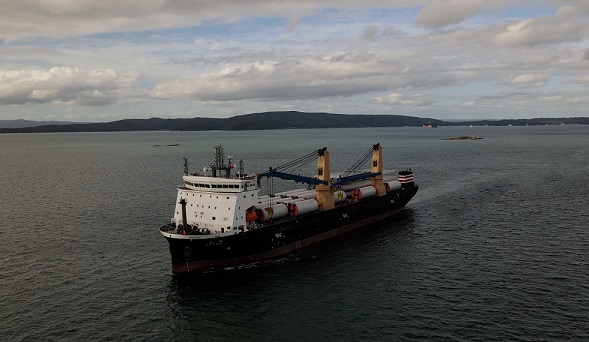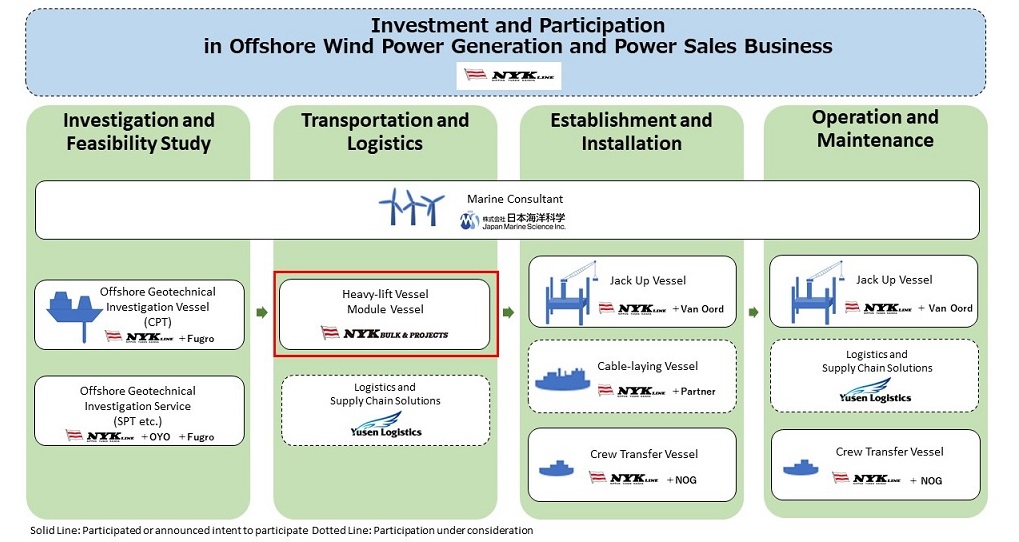Oct. 07, 2021
New Heavy-Lift Vessel Katori Enters Nanao Port for First Time
On October 6, the next-generation energy-saving heavy-lift carrier Katori entered the port of Nanao in Ishikawa prefecture for the first time, transporting wind turbine equipment loaded at the port of Dalian and port of Jiangyin, China.
Katori is a next-generation energy-saving ship ordered by NYK Bulk & Projects Carriers Ltd., an NYK Group company, from Jinling Shipyard. The vessel was delivered on September 8.
In the future, Katori will be engaged in the transportation of various types of cargo, including LNG (liquefied natural gas), power plant cargo, and wind power generation equipment.
This ship will be equipped with two 400-ton cranes and be able to lift up to 800 tons of heavy cargo. The hold will be about 95 meters in length at its maximum without any bulkheads. The ships will be hatch coverless, which will allow for navigation with the hatch cover open, and the bridge will be placed at the ship front, enabling the loading of tall and large cargo without worry of any disruption to forward visibility during navigation.
As an environmental benefit, a significant reduction in fuel consumption has been achieved compared to existing ships of the same type with the cooperation of Japanese marine equipment manufacturers. In addition, the vessels can reduce greenhouse gas emissions and meet in advance EEDI (Energy Efficiency Design Index) Phase 3 requirements that will become effective in 2025. These energy-saving heavy-lift vessels give maximum consideration to the environment.

- Ship Specifications
・Length: about 138.00 m
・Breadth: about 23.60 m
・Depth: about 8.30 m
・Deadweight: about 12,470 tons
・Crane capacity: 800 mt (400 mt x 2)
・Flag: Panama
On February 3, NYK released the NYK Group ESG Story, which aims to further integrate ESG into the company’s management strategy and promotes activities that contribute to the achievement of the SDGs (Sustainable Development Goals) through business activities. In the offshore wind power generation business, we are promoting collaboration with domestic and overseas partners and are widely involved in the supply chain.
To strongly promote ESG management, the NYK Group will encourage new value creation as a sustainable solution provider through a business strategy that includes efforts to contribute to the renewable energy business in Japan and overseas.

The NYK Group’s Service Scope for Offshore Wind Power

<NYK Group ESG Story>
A guideline detailing concrete efforts to integrate ESG into management strategies of the NYK Group.
* EEDI requirements
Regulations on the energy efficiency of ships based on the 2013 revision of the International Convention on the Prevention of Ship Pollution 1997 Protocol (Appendix VI to the MARPOL Convention). EEDI (Energy Efficiency Design Index) is the number of grams of carbon dioxide (CO2) required to carry 1 ton of cargo for 1 mile, and the reduction rate from the baseline (baseline) will be gradually enhanced. Car carriers are required to implement reductions of 5% by 2015 (Phase 1), 15% by 2020 (Phase 2), and 30% by 2025 (Phase 3).
The news on this website is as of the date announced and may change without notice.